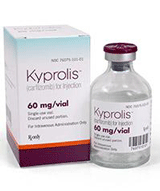Johnson & Johnson's ($JNJ) new multiple myeloma treatment Darzalex (daratumumab) scored a speedy FDA approval, entering a market that's already crowded with last-ditch treatments. But the company is hoping an impressive response rate will help the new med knock aside Celgene's ($CELG) Pomalyst and Amgen's ($AMGN) Kyprolis in the battle for market share.
 Pomalyst, a follow-up to Celgene's megablockbuster Revlimid, and Kyprolis have been duking it out as third-line treatments since they hit the market in 2013. Despite the latter's 8-month head start, Pomalyst has carved out a bigger share in that setting, which covers patients who've relapsed on at least two previous therapies. Both companies see expanded approvals as key to sales growth, and Kyprolis got its FDA nod for second-line use--in patients who've relapsed after one round of drug therapy--in July.
Pomalyst, a follow-up to Celgene's megablockbuster Revlimid, and Kyprolis have been duking it out as third-line treatments since they hit the market in 2013. Despite the latter's 8-month head start, Pomalyst has carved out a bigger share in that setting, which covers patients who've relapsed on at least two previous therapies. Both companies see expanded approvals as key to sales growth, and Kyprolis got its FDA nod for second-line use--in patients who've relapsed after one round of drug therapy--in July.
Darzalex pricing will be competitive, at least compared to Pomalyst, whose $147,302 list price made FiercePharma's ranking of most expensive drugs last year; Kyprolis ran about $114,000 per year at the time. The J&J drug will run $5,850 per infusion, which start out weekly and then move to biweekly, then monthly; at 23 doses, the first full year would run $135,550 on average, J&J says. Follow-up for a second year would be $6,337 per monthly infusion, for a total of $76,044. Payer discounts off that sticker price will vary, off course.
Darzalex is approved for patients whose cancer has returned after three rounds of therapy, putting it after Kyprolis and Pomalyst in the disease course. But multiple myeloma patients tend to live longer than those with other cancer types, and repeated courses of treatment are common. And J&J will be armed with data showing 36% of patients responded to the top dose of Darzalex in a small study, a number that handily beats Kyprolis' 23%.
"The efficacy we're seeing is quite impressive for a clinical trial of refractory multiple myeloma, given that many patients had already undergone five or more types of treatment," according to lead Darzalex investigator Dr. Saad Zafar Usmani, a hematologist at Levine Cancer Institute/Carolinas Healthcare System, who presented his daratumumab data at the American Society of Clinical Oncology meeting in May.
 |
| Dr. Richard Pazdur |
Darzalex also works differently from Pomalyst, which targets a protein known as cereblon, and Kyprolis, which, like J&J and Takeda's Velcade, is a proteasome inhibitor. Darzalex is an antibody that targets a particular protein, CD38, on the surface of multiple myeloma cells. That differing method of action is what makes the new drug valuable for treating relapsed disease, said Dr. Richard Pazdur, who heads up the FDA's hematology and oncology arm in the Center for Drug Evaluation and Research.
"Targeting proteins that are found on the surface of cancer cells has led to the development of important oncology treatments," Pazdur said in a release. "Darzalex provides another treatment option for patients with multiple myeloma who have become resistant to other therapies."
Some analysts have pegged Darzalex as a blockbuster contender, and there's no doubt that the multiple myeloma field is bringing in big sales. Revlimid has been Celgene's superstar for years, and it has said it expects Pomalyst to hit $1.5 billion by 2017.
- read the release from FDA
Special Reports: The top 10 most expensive drugs of 2013 - Pomalyst | Top 20 orphan drugs by 2018 - Kyprolis